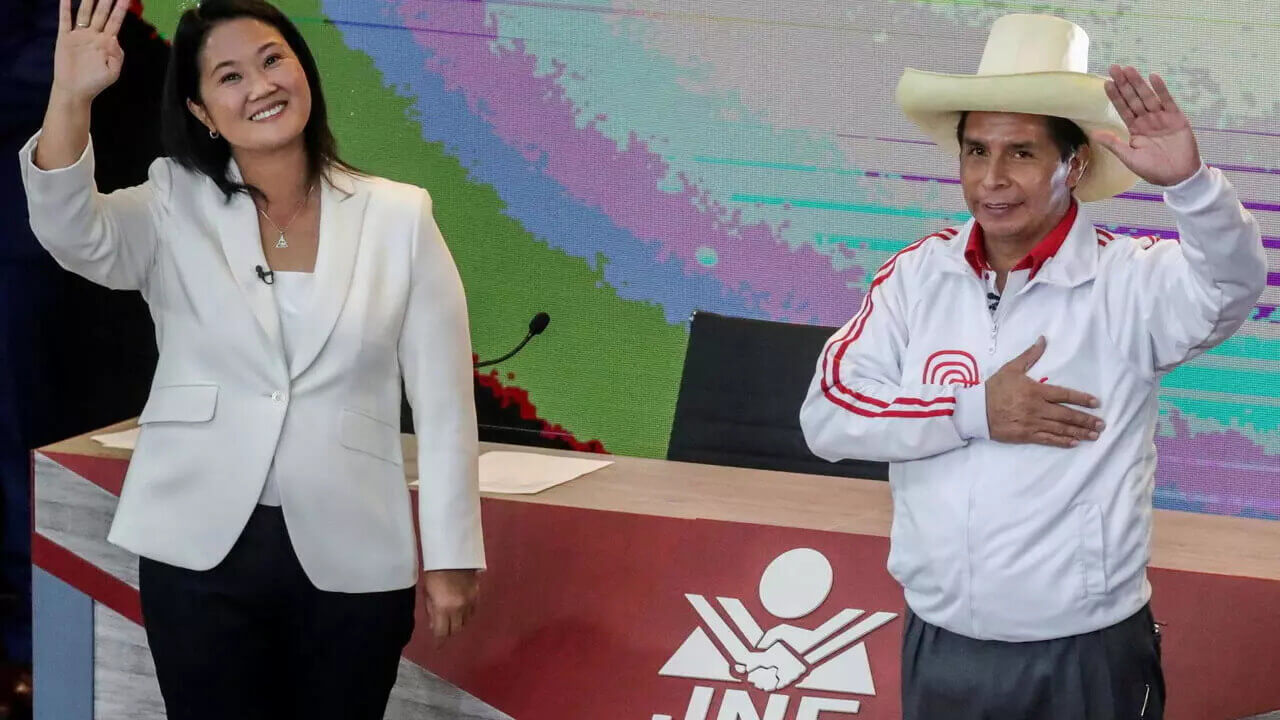Peruvian conservative candidate Keiko Fujimori holds a marginal lead over leftist candidate Pedro Castillo in the country’s run-off presidential election, according to provisional results from the National Office of Electoral Processes (ONPE) on Monday. With just over 93% of votes counted, Fuerza Popular’s Fujimori has 50.1% of votes, compared to Peru Libre’s Castillo, who accounts for 49.9% of votes.
ONPE chief Piero Corvetto, however, said that these only represent the “result of the advances of the premises closest to our computer centres,” before adding, “They are urban. It is necessary to process rural places and the vote abroad.”
Echoing these statements, Castillo told his supporters to “remain calm” as “what we have heard is not official.” Fujimori, however, was less cautious in her approach and de declared, “This campaign is over and it is essential to build bridges and dialogue.” Demonstrating how close things are, however, just on Sunday, Castillo was ahead by 0.4%. Even now, there are just 17,000 votes separating the two candidates.
Meanwhile, on Friday, interim President Francisco Sagasti called on citizens to “wait for the official results of the electoral authorities,” and urged the candidates and their parties to “scrupulously respect the will of the people expressed at the polls.”
This election represents Fujimori’s third attempt at running for the highest office in the country at comes at a time when the country is highly divided. Despite Fujimori and Castillo both receiving enough votes to contest the run-off election, neither candidate is particularly popular. In fact, in the first round of voting, when there were 18 candidates, neither received more than 20% of votes.
The election also comes during the ongoing COVID-19 pandemic, which has claimed 184,000 lives in Peru and cost two million people their jobs. Furthermore, roughly one-third of the country now lives in poverty.
Against this backdrop, Fujimori has proposed a neoliberal free-market model that relies on tax cuts and strengthening the private sector to generate employment. She has also pledged to offer $2,600 to every family that has lost someone to COVID-19 and to offer $2.6 billion in loans to small businesses. This will be supported by delivering free water to communities that are not connected to the main supply grids and granting two million land titles.
Meanwhile, Castillo has proposed redrafting the constitution, expanding the role of the state, increasing taxes on the profits of mining companies, and nationalising critical industries such as copper. Furthermore, he has said that he will cancel major mining projects in Conga and Tingo Maria, reform the pension system, decentralise public universities, and create a ministry of science and technology to increase innovation and industrialisation.
While urban and richer citizens support Fujimori, Castillo counts on the support of the rural poor. Some citizens are also disgruntled by the Fujimori name, as her father, former President Alberto Fujimori, who was in office from 1996 to 2000, is currently in prison for embezzlement. In fact, her father has previously said that if his daughter emerges victorious, “she will have to fulfil her campaign promise: to pardon her father.”
Aside from the candidates, there is also a decline in the credibility and legitimacy of the presidency as a whole, given that Peru has had four presidents in the past three years. Furthermore, seven of the country’s last 10 presidents have either been convicted of or investigated for corruption in some form.
While citizens are divided, there is, however, an appetite for change, no matter how it may look, as evidenced by the fact that voter turnout was recorded at 76.9%.
The winner of the election will be sworn in on July 28.
UPDATE: Since the time of publication, 95% of votes have been counted and Castillo is now in the lead with 50.3% of votes to Fujimori’s 49.7%. However, Fujimori has refused to concede, alleging that there is a “clear intention to boycott the will of the people.” She has accused Castillo of ‘stealing’ votes and has refused to concede defeat. Castillo, however, has unsurprisingly refuted these allegations.

